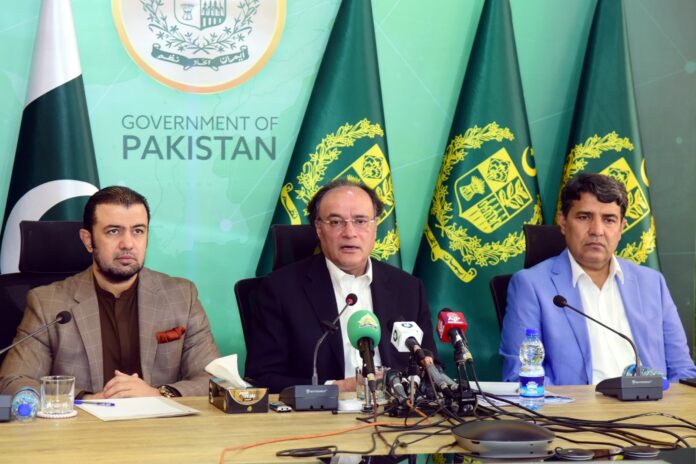ISLAMABAD, Apr 05 (APP): Federal Minister for Finance and Revenue, Senator Muhammad Aurangzeb, while responding to the changing US trade policy and tariffs under President Donald Trump’s administration, said here on Saturday that Pakistan intends to send a high-level delegation to Washington to convey its commitment to a long-term strategic partnership.
“In the next couple of days, we are going to finalize our recommendations to the prime minister and ….. with approval of PM, we intend to send a high level delegation to Washington to get our views across and to ensure that we want to be a partner, which is a long term strategic partner,” the minister said while addressing a press conference here.
He said, two committees were constituted including a steering group, led by Finance Minister and a working group, headed by the Secretary of Commerce, and there were meetings over the last couple of days and will continue with a view to transform challenges into opportunities.
“You should never let good crisis go to waste. We are looking it both challenge as well as opportunity,” he said adding the government was constructively engaged and was working on a package and when finalized, it can go forward for discussion with US administration.
He said, Pakistan wanted to make sure to have win-win situation in medium to long terms for both the counties. He said US was very important strategic partner and was also the largest trading partner in terms of exports which go to the US.
Meanwhile, talking about the economic stability and sustainability, the minister said, Pakistan aims to drive growth through export-led, production-led, and private sector-led strategies, focusing on increasing foreign exchange reserves, promoting business confidence, and implementing structural reforms.
He said, the country had achieved macroeconomic stability however adding it was not an end in itself rather it’s a means to an end. “It’s about basic hygiene. Any economy has to have these elements before it goes forward.”
He said Pakistan on the external front have seen stability as it has witnessed rising foreign exchange reserves on the back of very strong remittances, citing 32% increase during first two months on year on year basis.
The Minister added that exports were also holding firm and witnessing about roughly 7% growth on that front as well. And on the back of that, we are quite confident that the foreign exchange reserves, by the time we get to end of June, will be a little over $13 billion.
On the domestic front, he said, inflation was down to 0.7 percent, lowest of 6 decades. “We are moving in the right direction in terms of headline and the core inflation as well,” he added. He said, an institutional mechanism was in place to monitor inflation and ensure its impact goes down.
He said, the mark-up rate has also declined, bringing down the Kibor for the benefit of industry
He was of the view that business confidence, the investor confidence, the consumer confidence has increased as indicated by various reports.
The Minister also discussed the government’s efforts to promote structural reforms, including taxation, energy, and privatization. He said 24 state-owned enterprises have been handed over to the privatization commission, adding re-launch of PIA is going to be done this month.
He said, economic activity has increased as the economic spending increased to about 870 billion rupees compared to last year’s 720 billion.
However, the minister emphasized the importance of export-led growth, saying that every single sector of this country has to export, no matter what percentage they do. We have started seeing the auto sector starting exports.
Talking about Staff Level Agreement with International Monetary Fund (IMF), he said, it successfully concluded six-monthly review adding it happened because all our quantitative benchmarks were in a good place. The structural benchmarks also witnessed historic development, he said adding the agriculture income tax through the provincial assemblies was historic.
So as the board approves it, we will get an additional $1 billion in terms of the next tranche, which is there under the current EFF program. He said, negotiations on Resilience and Sustainability Fund also continued.
He said, the current programme with the fund was need of the country adding that it could be the last programme provided difficult policy choices are made.
On structural reforms, the minister said these were going on. He said, on taxation side, the country was on track to hit 10.6% tax to GDP at the end of June compared to 8.8% of last fiscal year. We will reach 13.5% gradually. The revenue target will be up by 32.5% year-on-year basis this year. The tax-base was also expanding as tax filers doubled from 2 million to 4 million by October 31. The number of returns have crossed 6 million.
Likewise, digital transformation in enforcement in customs helped increase revenues by 16 percent while track and trace system has been now fully rolled out in fertilizer, sugar, tobacco sectors. Cement, beverages, cotton, is on the way.
Filing returns is being simplified through people process technology and salaried class would be enabled to file taxes from homes, without consulting tax lawyers or consultants.
On energy side, he said one-third of electricity tariff was coming down for industry, which he said was significant change adding that industry also acknowledges this. He said, restructuring was being done in NTDC, DISCOS to ensure sustainability.
Talking about structural reforms, he said there were 400 departments attached with ministries, we are taking gradually the ministries and departments to restructuring and rightsizing.
First two waves were approved by the government, next two ways are going to be presented to the cabinet while fifth wave is now coming through. We will have completed entire analysis by June this year to have quantitative impact on upcoming budget.
On debt side, he maturity has gone up to 3.5 years while the government will be saving of Rs.1 trillion in terms of debt servicing loss.

